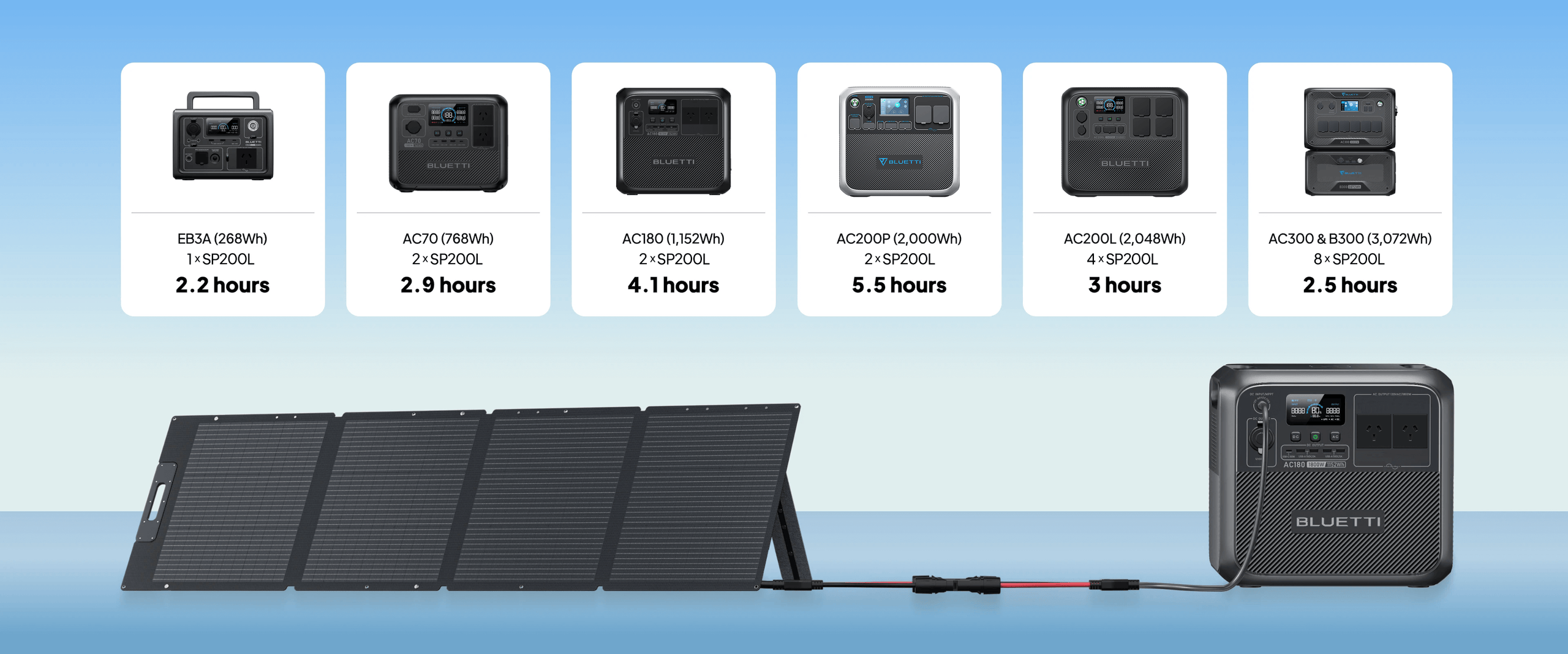If you're looking to increase your solar energy efficiency and reduce your monthly electricity costs, integrating a BLUETTI energy storage system with your solar panels could be the perfect solution. This approach lets you store the energy your panels generate during the day, allowing you to tap into it during peak hours when electricity rates are at their highest. In this article, we'll explore the practical ways solar and storage can optimize your energy usage, lower bills, and offer more energy independence.
What Is Solar Panel Efficiency in Australia?
Solar panel efficiency refers to the percentage of sunlight a solar panel can convert into usable electricity. In Australia, where sunlight is abundant, the efficiency of your solar panels plays a significant role in maximizing the energy you can generate. Standard residential solar panels typically range from 15% to 22% efficiency, with more advanced panels offering even higher rates. Given Australia’s strong solar radiation, even small increases in efficiency can yield significant benefits over time, reducing your reliance on grid electricity and cutting monthly energy costs.

What Is Solar Panel Power Rating?
The power rating of a solar panel indicates the amount of electricity the panel can produce under ideal conditions, measured in watts (W). For example, a 300W panel can produce 300 watts of power per hour under optimal sunlight. The power rating helps you determine how much electricity your solar setup can generate based on the number and type of panels installed. Higher-rated panels allow you to generate more power in less space, which is especially useful for smaller rooftops or compact setups like caravans.
Why Does Solar Panel Efficiency Matter?
Higher efficiency means more power generated per square meter of panel, allowing you to meet more of your household’s energy needs without expanding your setup. Efficient panels generate more electricity throughout the day, even when sunlight conditions are less than perfect. This increased output can reduce the amount of energy you need from the grid, helping you achieve greater energy independence and higher savings on electricity bills.
What Affects Solar Panel Efficiency?
Several factors can impact the efficiency of solar panels, including:
- Temperature: Higher temperatures can decrease panel efficiency, so ensuring adequate ventilation and choosing high-quality, temperature-resistant panels can help.
- Angle and Orientation: Placing panels at an optimal angle facing north (in the Southern Hemisphere) ensures maximum exposure to sunlight throughout the day.
- Shading: Even partial shading from trees, chimneys, or nearby buildings can significantly reduce efficiency. Placing panels in unshaded areas is essential.
- Maintenance: Regular cleaning and maintenance keep panels free of dirt and debris that can block sunlight and reduce output.
- Quality and Type of Panels: Monocrystalline panels typically offer higher efficiency than polycrystalline options, making them ideal for areas with space constraints.
Portable Solar Panels for Caravans
For those looking to travel or power a caravan, portable solar panels offer a flexible and efficient solution. Portable panels can be set up quickly and angled for optimal sun exposure, making them highly efficient for outdoor needs. Compact yet powerful, these panels allow caravan owners to harness solar energy, charge batteries, and run essential appliances on the go. A storage solution like the BLUETTI portable battery system can also store energy generated during the day, providing reliable power even after the sun goes down.
Solar Panel Efficiency: Solar Panel Placement
Proper placement is key to solar panel efficiency. In Australia, installing panels at an angle between 20° and 30° facing north (in the Southern Hemisphere) generally yields the best results. The correct orientation ensures your panels capture the most sunlight, especially during midday when solar radiation is strongest. Adjusting angles seasonally can further enhance efficiency, but most residential setups are designed to be effective year-round.
Solar Panel Efficiency: Weather Conditions
Although solar panels work best under direct sunlight, they still generate some power on cloudy days, though at a reduced efficiency. Weather conditions like overcast skies or heavy rain can temporarily decrease output, while dust storms or pollution may also limit sunlight exposure. In areas with frequent cloud cover, combining solar panels with an efficient energy storage system like BLUETTI can ensure you have power when sunlight is limited.

BLUETTI Solar Panels with Higher Efficiency
BLUETTI solar panels are designed with high-efficiency monocrystalline cells, offering better performance even in partial sunlight. These panels are ideal for maximizing energy generation on rooftops, in caravans, or as portable setups for outdoor use. Combined with BLUETTI’s power stations, they provide a seamless and reliable source of energy, storing excess power generated during sunny periods for use during peak hours or cloudy days. With their advanced technology and durable build, BLUETTI panels are a solid choice for households and travelers looking to optimize solar energy efficiency and enjoy consistent power savings.



